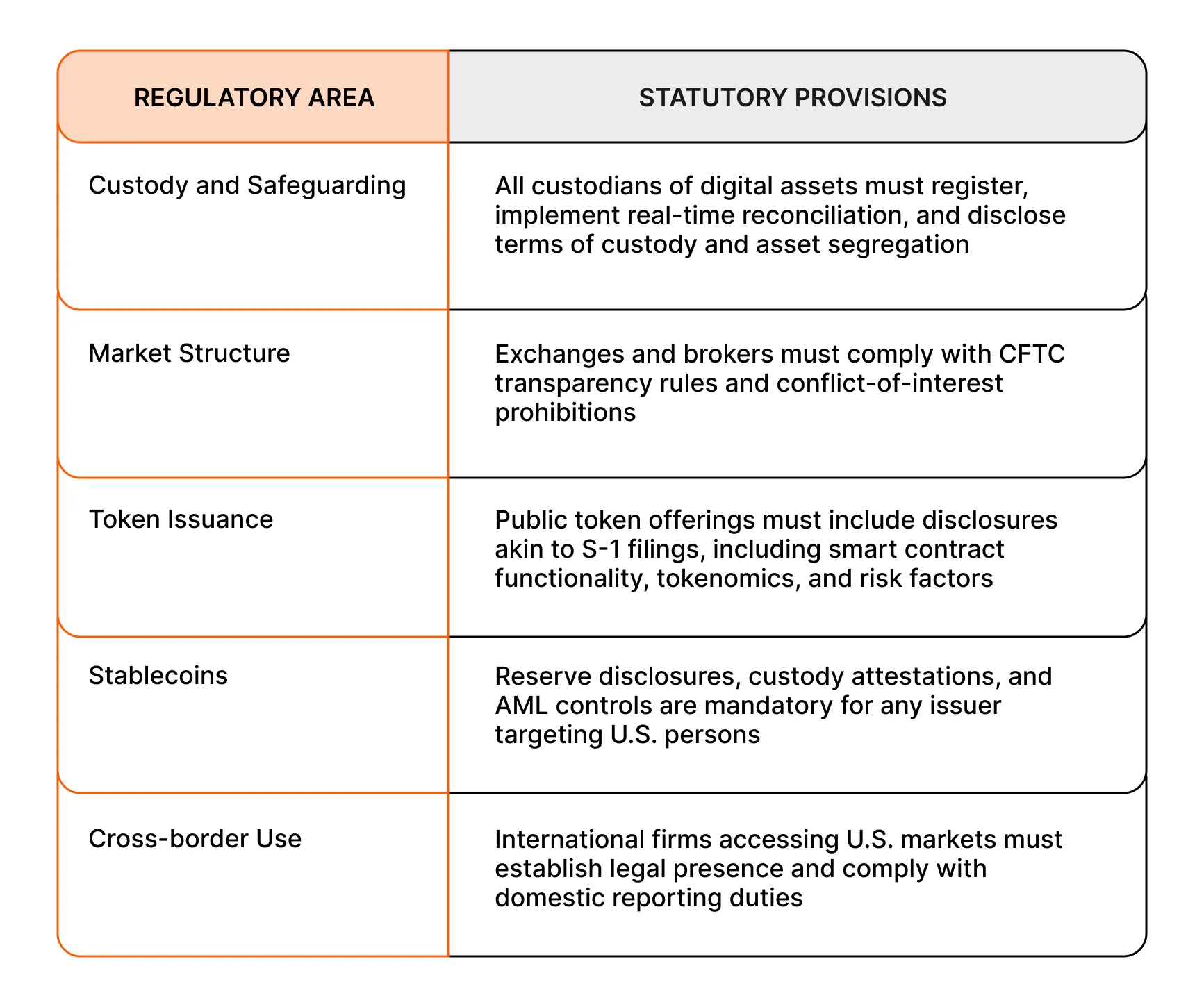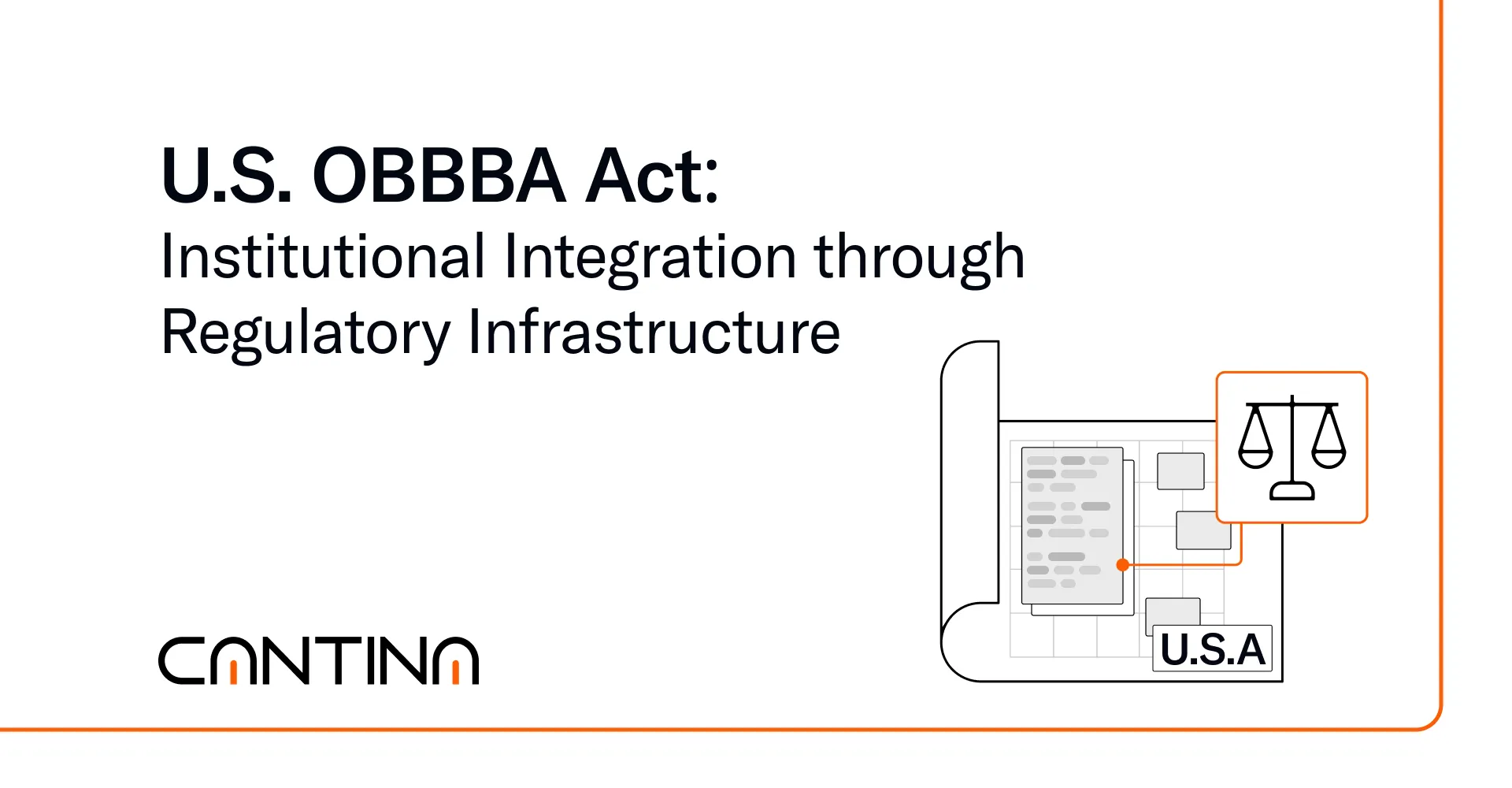Introduction
In July 2025, the U.S. House of Representatives passed the One Big Beautiful Bill Act of 2025 (OBBBA), a sweeping legislative package that, among other sectors, introduces statutory clarity and jurisdictional alignment for crypto markets. The OBBBA outlines agency responsibilities, mandates transparency, and embeds compliance obligations across financial infrastructure. For institutions engaging with decentralized systems, the rule reframes expectations for security, disclosure, and operational accountability.
This blog examines the provisions of the OBBBA relevant to the digital asset industry, and analyzes how these developments shape institutional standards moving forward.
U.S. Regulatory Jurisdiction: Formal Divisions of Responsibility
The bill codifies the role of the Commodity Futures Trading Commission (CFTC) as the lead regulator for crypto commodities, including most tokens and public chain assets. It affirms the Securities and Exchange Commission (SEC)’s oversight of tokenized equities and investment contracts.
This division eliminates regulatory ambiguity for many institutional actors. Crypto-native organizations that issue, list, or facilitate transfer of digital assets must align with the designated agency based on asset classification. Failure to comply no longer results in regulatory overlap but in direct enforcement under clarified statutory language.
Core Requirements of the OBBBA

These provisions require formal, verifiable alignment between protocol operations and investor protections. Systems that do not meet these requirements will be excluded from licensed financial channels.
Institutional Signaling: How Rules Reshape Engagement
For financial institutions, the OBBBA provides a framework to evaluate which DeFi organizations qualify as legitimate counterparties. Due diligence now includes:
- Code-level disclosure and review of token logic
- Verification of redemption systems, access controls, and governance thresholds
- Transparency in asset flows and oracle dependencies
- Legal clarity around rights, remedies, and contractual enforcement
As the regulatory environment matures, institutions will consolidate partnerships around systems that present operational transparency and security assurance.
Industry Readiness: Cantina’s Observations from Protocol Reviews
Cantina has reviewed systems across DeFi, stablecoins, and staking protocols. We observe common gaps that intersect with new statutory expectations:
- Incomplete access role enforcement and control renunciation
- Fragile redemption mechanics that fail under stress
- Missing documentation for upgrade paths and failover logic
- Lack of reconciliation between vault share issuance and reserve composition
These findings highlight the need for contract architectures that are not only secure but also traceable and auditable for institutional review.
Cantina’s Role in Regulatory-Grade Infrastructure
Cantina supports organizations preparing for institutional and regulatory integration through structured security assessments and system-level documentation. This includes:
- Source-level reviews of token, custody, and vault modules
- Scenario-based threat modeling around redemptions and governance manipulation
- High-signal assessments of oracle and attestation infrastructure for systemic risk exposure
The process creates defensible records that align with operational, legal, and security obligations.
Institutional Alignment: What This Rule Signals for Market Direction
A legislative platform that places decentralization within the structure of national economic strategy signals a directional shift. Digital assets are being integrated into long-term financial planning frameworks. Institutions will not wait for uncertainty to resolve itself. They will move toward systems that meet defined standards and offer operational clarity.
Banks, asset managers, and infrastructure providers are expected to seek partners who demonstrate readiness. That includes verified custody models, transparent governance, and audit-compatible transaction flows. These requirements shape the next phase of institutional market entry.
The systems that scale will be those with reviewable access logic, fault isolation, and credible resilience under regulatory and financial pressure.
Web3SOC: A framework guiding Institutional Confidence & Readiness
Cantina helps organizations build security, transparency, and reviewability into their systems from the start. We support infrastructure that meets institutional expectations by enabling high-signal code reviews, risk simulations, and verifiable documentation.
Web3SOC extends this alignment by providing a standardized evaluation framework, allowing institutions to classify and benchmark DeFi organizations based on operational, financial, security, and regulatory aspects.
- For institutions, Web3SOC offers a risk-evaluation tool to assess protocol readiness and reliability
- For organizations, it delivers clear improvement pathways and defensible assessments
Forward-looking DeFi organizations move from speculative readiness to verifiable trust by building systems that are institutionally compatible.
The process culminates in a complete organizational assessment. By aligning operational, financial, regulatory, and security practices to institutional standards, DeFi organizations present a clear and credible posture to investors.
When investors move, they move toward systems that are vetted, scored, and ready.
Contact us to ensure your system is ready for institutional engagement.




